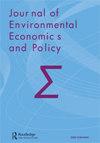The relationship between healthcare expenditure, CO2 emissions and natural resources: evidence from developing countries
IF 1.2
Q3 ENVIRONMENTAL STUDIES
Journal of Environmental Economics and Policy
Pub Date : 2021-10-10
DOI:10.1080/21606544.2021.1979101
引用次数: 12
Abstract
ABSTRACT The paper examines the association between health expenditure, carbon emission, economic growth, natural resources, and population in developing countries for 2000–2018. It further explores the relationship between these variables over the same period. The study applied Pooled mean group (PMG) and Dynamic ordinary least square (DOLS) estimations to explore the long and short-term impact of environmental pollution, economic growth, and natural resources on health expenditure. PMG and the DOLS results show that economic growth and environmental pollution, and natural resources increase health expenditure at the panel level. However, improved sanitation reduces health spending. The findings for the individual country level from the FMOLS confirmed similar results for some countries. Furthermore, there is bidirectional causality between health spending and economic growth. Developing nations should implement strategic environment management policies that enhanced clean and healthy air to decrease the pressure on health care expenses.医疗支出、二氧化碳排放和自然资源之间的关系:来自发展中国家的证据
摘要本文考察了2000-2008年发展中国家的医疗支出、碳排放、经济增长、自然资源和人口之间的关系。它进一步探讨了同一时期这些变量之间的关系。该研究应用了组合均值组(PMG)和动态常最小二乘(DOLS)估计,探讨了环境污染、经济增长和自然资源对卫生支出的长期和短期影响。PMG和DOLS结果表明,经济增长、环境污染和自然资源增加了面板层面的卫生支出。然而,卫生条件的改善减少了医疗支出。FMOLS对个别国家一级的调查结果证实了一些国家的类似结果。此外,医疗支出与经济增长之间存在双向因果关系。发展中国家应该实施战略环境管理政策,加强清洁和健康的空气,以减轻医疗保健费用的压力。
本文章由计算机程序翻译,如有差异,请以英文原文为准。
求助全文
约1分钟内获得全文
求助全文
来源期刊

Journal of Environmental Economics and Policy
ENVIRONMENTAL STUDIES-
CiteScore
4.70
自引率
7.70%
发文量
26
 求助内容:
求助内容: 应助结果提醒方式:
应助结果提醒方式:


